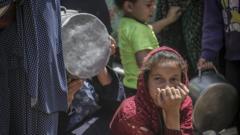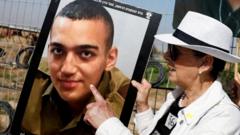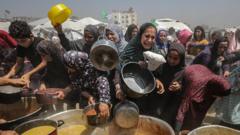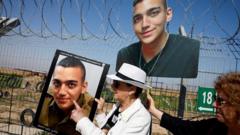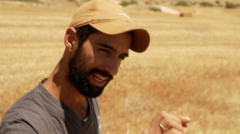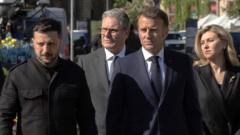In the wake of violent confrontations triggered by the arrival of Israeli football fans, Amsterdam grapples with a surge of antisemitism and societal tensions.
Amsterdam Under Strain: Unrest Unfolds Amid Rising Tensions
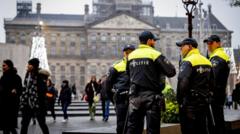
Amsterdam Under Strain: Unrest Unfolds Amid Rising Tensions
The recent violence in Amsterdam highlights deep-seated societal divisions, particularly between Jewish and Muslim communities, amid geopolitical turmoil.
The aftermath of last week's violence in Amsterdam reveals a fragile calm, following chaotic incidents that left the city reeling after a confrontation involving Israeli football fans. Anti-Semitic sentiments, hooliganism, and anger spurred by the ongoing conflict in Gaza have merged to create a toxic environment, according to city officials. The violence has exacerbated already strained relationships within the communities of Amsterdam, particularly between Jewish and Muslim residents.
Local Rabbi Lody van de Kamp characterized the situation as a volatile tinderbox, predicting trouble when 2,000 Israeli supporters descended upon the city for a Europa League match. The alarming events were intensified by the unfortunate coinciding of the riots with the anniversary of Kristallnacht, echoing painful historical memories for the Jewish community, who expressed feelings of siege.
A government report highlighted the series of violent acts committed by both Maccabi supporters and small groups of rioters targeting the nightlife crowd and Israeli fans at various locations. The confrontations saw calls for retaliation surface on social media, fanning the flames of an already heated landscape.
Amidst this turmoil, both Jewish and Muslim leaders have pointed to an understanding of the profound sorrow and frustration felt within their communities, yet the political fallout has not been contained. A junior minister, whose Moroccan heritage was brought up in coalitional discourse, resigned, citing racism and inappropriate rhetoric from colleagues as her reason.
The chair of the Central Jewish Committee underscored the growing antisemitic rhetoric since the escalation of hostilities in Gaza, warning against underestimating threats made toward Jewish lives. While the Dutch government allocated €4.5 million to combat such sentiments, many community leaders believed addressing these incidents requires more than monetary support.
Prominent figures from the Moroccan community have expressed concerns over being scapegoated amid calls for action against antisemitic incidents. As a precarious dialogue unfolds, the rising tensions seem poised to pivot into a larger narrative of division, amplifying fears among both Jewish and Muslim circles.
Calls for unity and understanding have emerged from prominent academics and community leaders desperate to prevent an escalation into further violence. They emphasize the need for nuanced dialogue to avoid equating current unrest with historical episodes of violence that plagued Europe.
Both communities are struggling in the wake of these events, with emotional scars deepening as they navigate the complexities of identity and safety in an increasingly polarized Europe. The hope remains that through collective dialogue and understanding, Amsterdam can reclaim its narrative as a city celebrated for its diversity and tolerance. As disputes linger over identities, Rabbi van de Kamp echoes this sentiment: "We are allowed to be very angry, but we must never hate."

